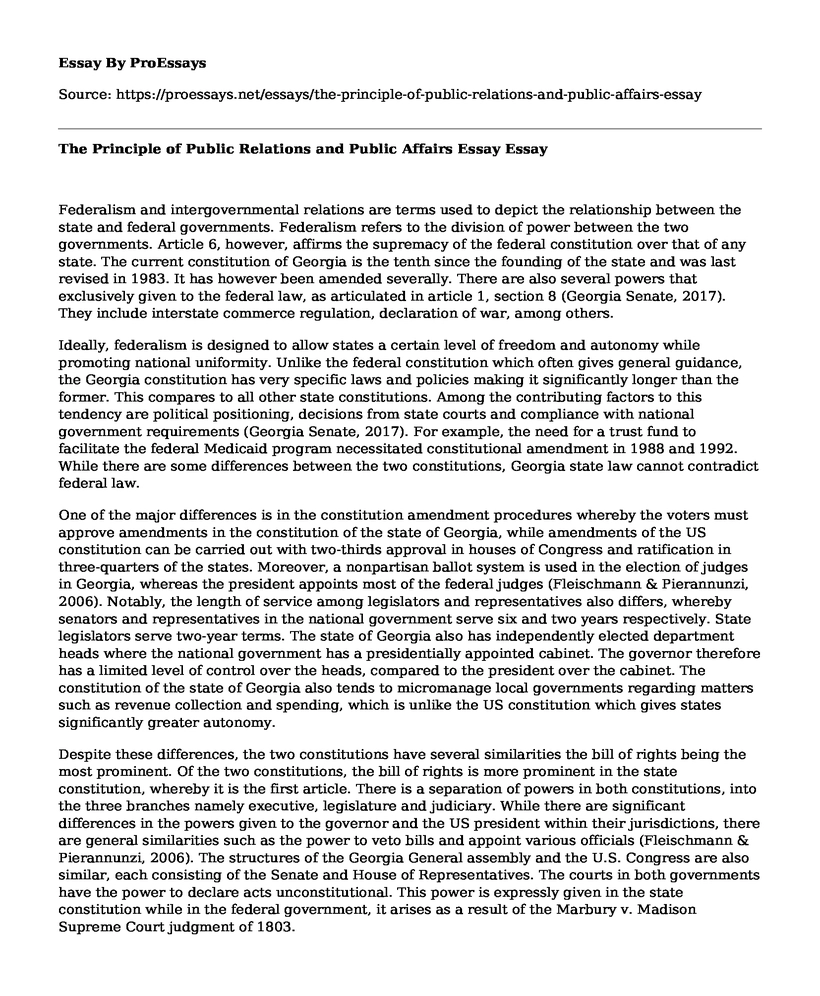Federalism and intergovernmental relations are terms used to depict the relationship between the state and federal governments. Federalism refers to the division of power between the two governments. Article 6, however, affirms the supremacy of the federal constitution over that of any state. The current constitution of Georgia is the tenth since the founding of the state and was last revised in 1983. It has however been amended severally. There are also several powers that exclusively given to the federal law, as articulated in article 1, section 8 (Georgia Senate, 2017). They include interstate commerce regulation, declaration of war, among others.
Ideally, federalism is designed to allow states a certain level of freedom and autonomy while promoting national uniformity. Unlike the federal constitution which often gives general guidance, the Georgia constitution has very specific laws and policies making it significantly longer than the former. This compares to all other state constitutions. Among the contributing factors to this tendency are political positioning, decisions from state courts and compliance with national government requirements (Georgia Senate, 2017). For example, the need for a trust fund to facilitate the federal Medicaid program necessitated constitutional amendment in 1988 and 1992. While there are some differences between the two constitutions, Georgia state law cannot contradict federal law.
One of the major differences is in the constitution amendment procedures whereby the voters must approve amendments in the constitution of the state of Georgia, while amendments of the US constitution can be carried out with two-thirds approval in houses of Congress and ratification in three-quarters of the states. Moreover, a nonpartisan ballot system is used in the election of judges in Georgia, whereas the president appoints most of the federal judges (Fleischmann & Pierannunzi, 2006). Notably, the length of service among legislators and representatives also differs, whereby senators and representatives in the national government serve six and two years respectively. State legislators serve two-year terms. The state of Georgia also has independently elected department heads where the national government has a presidentially appointed cabinet. The governor therefore has a limited level of control over the heads, compared to the president over the cabinet. The constitution of the state of Georgia also tends to micromanage local governments regarding matters such as revenue collection and spending, which is unlike the US constitution which gives states significantly greater autonomy.
Despite these differences, the two constitutions have several similarities the bill of rights being the most prominent. Of the two constitutions, the bill of rights is more prominent in the state constitution, whereby it is the first article. There is a separation of powers in both constitutions, into the three branches namely executive, legislature and judiciary. While there are significant differences in the powers given to the governor and the US president within their jurisdictions, there are general similarities such as the power to veto bills and appoint various officials (Fleischmann & Pierannunzi, 2006). The structures of the Georgia General assembly and the U.S. Congress are also similar, each consisting of the Senate and House of Representatives. The courts in both governments have the power to declare acts unconstitutional. This power is expressly given in the state constitution while in the federal government, it arises as a result of the Marbury v. Madison Supreme Court judgment of 1803.
References
Fleischmann, A., & Engstrom, R., & Howard R. M. (2014). Georgia's Constitution and Government. Retrieved from https://www.amazon.com/Georgias-Constitution-Government-Richard-Engstrom/dp/0820347183
Georgia Senate. (2017). Constitution of the State of Georgia. Retrieved from http://www.senate.ga.gov/Documents/gaconstitution.pdf
Cite this page
The Principle of Public Relations and Public Affairs Essay. (2022, Jul 26). Retrieved from https://proessays.net/essays/the-principle-of-public-relations-and-public-affairs-essay
If you are the original author of this essay and no longer wish to have it published on the ProEssays website, please click below to request its removal:
- Target Market Segment: South Africa
- Operations Management Concepts and Tools Paper Example
- Should Religious Entities Qualify for Non-profit Status? Essay
- Essay Sample on Public Relations Role in a Firm
- Essay on SmartTech Consultants: 5-Year Strategic Plan for Up-Scaling & Quality Service
- Cultural Branding: Turning Brands Into Icons for Fashion & Luxury - Essay Sample
- Paper Example on Social Hierarchies and Their Impact







